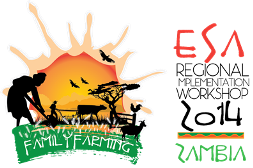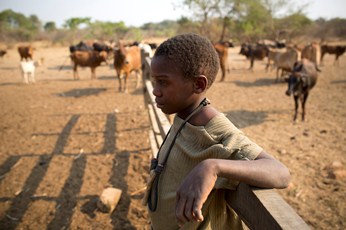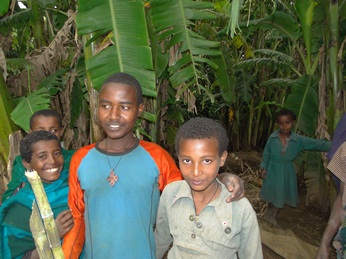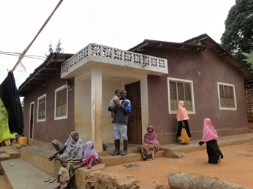
Contacts
Helene Ni Choncheanainn
Programme Assistant, East and Southern Africa Division
East and Southern Africa Division
IFAD
Via Paolo Di Dono, 44
00142 Rome, Italy
Fax: +39 06 5043463
Email: [email protected]
Past issues
About IFAD
The International Fund for Agricultural Development (IFAD) is a specialized agency of the United Nations, dedicated to eradicating poverty and hunger in developing countries. Its work in remote rural areas of the world helps countries achieve the Millennium Development Goals.
 IFAD and the International Year of Family Farming: Smallholder and family farming central to IFAD's mission
IFAD and the International Year of Family Farming: Smallholder and family farming central to IFAD's mission
Smallholder and family farming are central to IFAD's mission of reducing poverty and hunger in the rural areas of the developing world. IFAD-supported programmes help poor rural people improve their food and nutrition security, increase their incomes and strengthen their resilience. Read more
 ESA's response to Family Farming: Regional Implementation Workshop 2014
ESA's response to Family Farming: Regional Implementation Workshop 2014
ESA is actively engaged in promoting broad discussion at the national, regional and global levels to increase awareness and understanding about the diverse contributions from, challenges faced by and support needed for Family Farmers and smallholders in East and Southern Africa. Read more
 Land tenure: a critical issue to sustain family farming
Land tenure: a critical issue to sustain family farming
Land is fundamental to the many farming families whose livelihoods depend on it. However, their access to land is increasingly more threatened because of heightened competition as a result of rising world population, climate change, declining soil fertility and the need for global food and fuel security. Read more
 Ethiopia: Greater involvement of families in soil conservation in the Amhara region
Ethiopia: Greater involvement of families in soil conservation in the Amhara region
Women were not initially included in the conservation efforts put in place under a land rehabilitation project in Lake Tana. According to a traditional division of tasks, they were asked to stay at home to take care of the household tasks. It took the strong will of a group of women, as well as the vision of their respective husbands, to turn the situation around and fully involve the women of the community in the decision-making process. Read more
 Mozambique: Road rehabilitation to bring families closer to markets. In rural Mozambique, many smallholder farmers were prevented from selling their products to markets because of a lack of good access roads in remote rural areas. However, after the successful intervention of an IFAD project, families of farmers started to move their homes along a new road to become part of the new market created. Read more
Mozambique: Road rehabilitation to bring families closer to markets. In rural Mozambique, many smallholder farmers were prevented from selling their products to markets because of a lack of good access roads in remote rural areas. However, after the successful intervention of an IFAD project, families of farmers started to move their homes along a new road to become part of the new market created. Read more
 Uganda: Household Mentoring, a new methodology to tackle family issues
Uganda: Household Mentoring, a new methodology to tackle family issues
The Household Mentoring approach has the unique aspect of providing social transformation for the most vulnerable households by empowering them to make joint decisions as a family and tackle their challenges. So far, it has shown great improvement in family income, gender equality, as well as awareness of other programmes from which households can benefit. Read more
 Tanzania: Gender empowerment for improved family farming
Tanzania: Gender empowerment for improved family farming
One of the biggest achievements of the IFAD-supported Agricultural Services Support Programme in Tanzania is the empowerment of women who previously believed they couldn't venture into new farming activities. Through the implementation of effective targeting strategies and training programmes, women have gained a new voice and the ability to express themselves with confidence. Read more
 Zambia: Support to farmers families living with HIV-AIDS
Zambia: Support to farmers families living with HIV-AIDS
The Smallholder Agribusiness Promotion Programme (SAPP), supported by IFAD in Zambia, is a public-private endeavour to reduce rural poverty by stimulating rural economic development and driven by the transformation of small-scale producers into profitable family farmers. The programme targets small-scale farming households who are organised into enterprise groups or who have the potential to join groups that can be better linked to markets. Read more